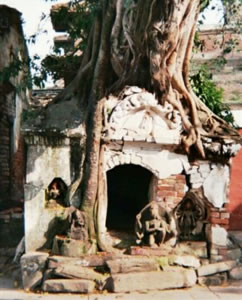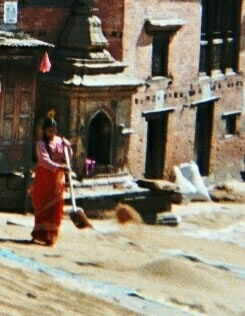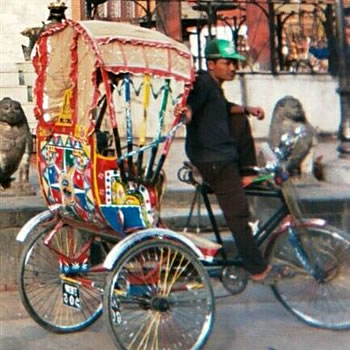| |
Saturday,
November 22
Pokhara
I was
awakened at about 5:25 AM by an earth tremor. The hotel was
shaking, everything inside and outside was shaking, and there
was a loud rumbling sound outside. People started yelling.
Is that an earthquake, I asked myself. Yes. Should I get out
of here? Then it stopped. So I didn't get up.
At 7:45 we had breakfast
together, Rob, Andy, and I. Andy thought we should change
our plans and try to leave that day to avoid the possibility
of future earthquakes. Rob was afraid that any change of plans
might result in our losing the seats we had reserved. Ailsa,
the co-owner of the hotel, called the airlines and discussed
it with them. She advised us to keep the reservations we had.
Later we gathered
the trekking gear we had borrowed from Krishna and headed
for the shop. We left it there and returned later, hoping
to catch all 3 of them there. Only Krishna and Lila were there.
We gave them some money to show our appreciation, thanking
them for doing such a good job with our trek. I gave Lila
a bandana as an extra thank you gesture for having shouldered
my big pack.
Later, Rob and I
went to find another orphanage/school/clinic that he thought
might be worth donating to. I had asked Ailsa that morning
if she knew where the orphanage was that Rob had seen when
he and Kay had stayed there 2 years before. She knew it, and
said it was gone, like a lot of scam orphanages. She explained
how they somehow got the kids and set up an orphanage in the
tourist part of town (very pricey real estate) and got tourist
contributions. Then they got rid of the kids and disappeared.
If you want to do charity work in Nepal, Ailsa advised, do
it on the personal level. But Ailsa also said this orphanage/school/clinic
might be worth investigating because it had been there for
quite some time and was doing good work.
The high point of
my day was calling Susan. I hadn't called her since London.
It was a delight to hear her voice and exchange words with
her and connect with home. Home. How far away it seemed.
I took the
afternoon for myself to go adventuring. I started at the Pokhara
Kitchen, a working people's eatery on the fringe of the tourist
section. According to one author, they served the best dahl
bat in Nepal. And I would rate the lentil soup as the best
I had eaten, but otherwise it was not impressive. However,
the lunch cost me only 50 rupees. At 74 rupees to the dollar,
quite a bargain.

I had gotten vague
directions to the business center of town, called Mindapul,
where Nepalis shop. I walked along the road until a small
bus came, a local bus that cost 8 rupees and was packed with
people, not even standing room. But they squeezed me in, and
several others along the way. Of course, when we stopped,
people had to get off, and they were located at the back of
the bus. It was an interesting experience. There were virtually
no westerners in sight. There was a bazaar of sorts, mostly
selling foodstuffs. There were shops lining the streets, and
so I started going from one to the next. When I found something
I liked, I would bargain for it. Often the shopkeepers spoke
some English, and I got a chance to use some of my minimal
Nepali vocabulary.
There were a lot
of fabric shops selling material for saris and such. I found
only a few pieces in each of several shops, and ended up with
a variety of fabrics in my backpack. They were from India
or Pakistan, not Nepal. I bought a broom, a one handed broom
that is universally used in Nepal with a bent over posture.
I found a lock like the ones that they use at guesthouses
and a handmade cooking pot at a hardware store. I didn't find
any yak bells, which I was hoping to give to Kay and Rob back
in London as a wedding present. But it was an interesting
experience trying to explain what I was looking for to people
who spoke no English. I do a good yak imitation.
It was a great experience
to get away from the comfort and complacency of the tourist
zone and see how the Nepalis shopped and ate and socialized,
and to soak in the sights and smells and sounds. I had been
to all of the basic kinds of stores that interested me. I
walked some streets looking for something different, being
careful not to lose my bearings, but found nothing. After
sitting with a Fanta lemon people watching for a while, I
caught the bus back to lakeside.

I met
Rob on the street and we went to a handmade paper store where
I bought some little calendars with woodcuts of Hindu symbols
and deities. After resting and reading and showering, the
three of us went out to dinner. Rob and Andy had a lively
but friendly dinner discussion and we lingered at the table
long after the food was eaten. Throughout the journey, I found
the political discussions between Rob and Andy fascinating.
They both were intelligent and articulate and had many opposing
views, but to me one of the most interesting aspects was to
witness them examining issues from their English point of
view. For example, Andy explained one reason why Tony Blair
should not have aligned the UK with the US in the second Iraq
war: "The UK doesn't really see itself as part of Europe.
Instead it is sort of between Europe and the US. We have a
choice. And to me, it would be better to align ourselves with
Europe, which is on the way up, than with the US, which is
on the way down." Rob believed that conversation was
an important aspect of meals, and that evening was a feast
in every regard. Everything felt right with the world, for
whatever reason. Andy put his arm around his dad as we walked
back to the Nirvana. They might argue politics, but I had
the feeling they always would be closer after this journey.
The
next day
this
travelogue is part of the subside
travelzine
about bookshelf
links contact
submit
|
|


